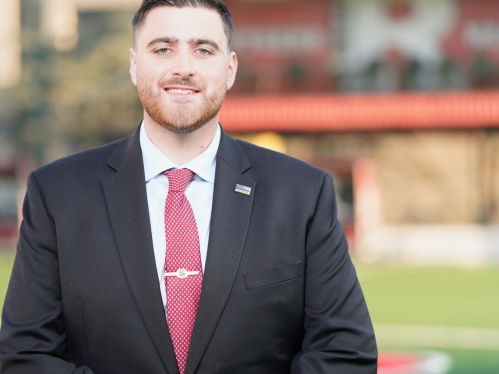Mark Steinberg
School of Public Affairs and Administration, Public & Non-Profit Administration / MA Public Administration
Mark's Story
Mark Steinberg, a Rutgers-Newark graduate pursuing a master’s degree from the School of Public Affairs and Administration, loves the vibrancy of Newark and RU-N’s diversity, which has made him a more effective leader in the field of public safety, he says.
“Working in the public sector, it’s especially important,’’ says Steinberg, who obtained his bachelor’s degree from RU-N in 2022. “I have diversity among professors, among students, and colleagues. And it’s not just diversity in race and ethnicity, it’s diversity in work experience, age and socioeconomic background. You’re getting perspectives you might not otherwise get from programs that don’t have that broad range and broad reach.’’
Steinberg, who graduated from Livingston High School in 2018, became a volunteer EMT in the town of Verona at age 16. “I fell in love with emergency services and I figured I wanted public safety to be my career path in some way. But I wanted to be close to home.’’
Rutgers-Newark, where he received his bachelor’s degrees, was not only conveniently located—commuting allowed him to keep his EMT job—it offered some of the best programs in his field..
Steinberg credits his education at the School of Public Affairs and Administration (SPAA) with paving the way for him to become a deputy emergency manager in Verona in his early-20s and later, an officer in the Essex County Sheriff’s Office, where he works now.
At SPAA, he developed skills that helped him navigate the world of municipal budgets, which are critical to public administration. “I gained an understanding of the government revenue system, budgeting, fundraising rules,’’ he said. “I paired my real world experience with information I got at SPAA.”
Lessons learned at SPAA have also shaped his perspective on leadership and how it can create positive change in law enforcement. “One thing that has impacted me is learning about organizational culture and top down leadership. That’s huge in law enforcement. There are a lot of negative organizational cultures where small issues lead to larger ones, and unless you address those small issues, it has a cancerous effect. You need to understand that as culture changes, so does your organization, especially when your primary stakeholder is the public. You have to adapt to what it needs.’’
He added, “I see myself as some day being an executive in a law enforcement agency. And I think with my education and experience, I’ll have a good ability to lead and teach others.’’
Steinberg’s professors were supportive, helping to nurture his aspirations and guide him in planning his career trajectory, he said. And through it all, he has enjoyed all that the city, and the Rutgers-Newark campus, have to offer.
“If I had to use one word to describe Rutgers-Newark, I would say alive,’’ explains Steinberg. “The community is alive, the city is alive, the relationship between the two is alive. It’s a flourishing environment that encourages a lot of student involvement and participation within the city I love that it’s in an urban environment, it’s never dead or quiet. There’s always something going on.’’

